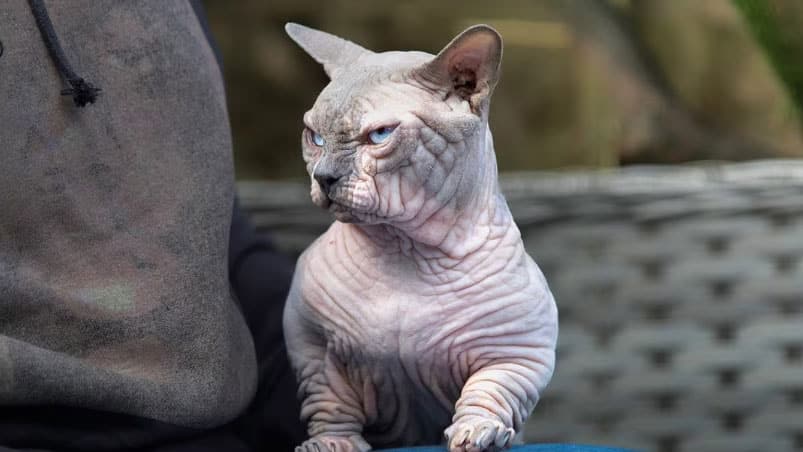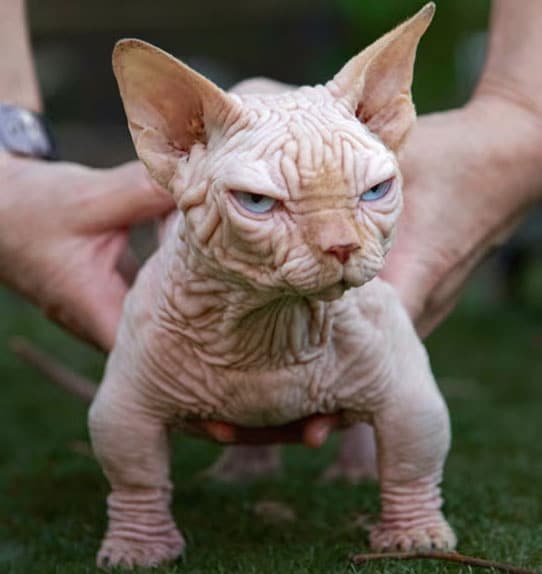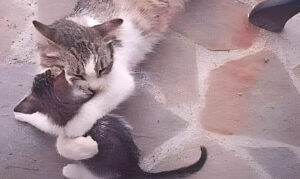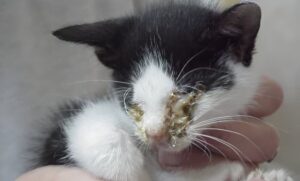Cat lovers often marvel at the diverse breeds available today, each with unique features and personalities. Among these is the controversial “bully cat,” an unearthly cross between a Sphynx cat and a bulldog. While intriguing at first glance, these aggressive cat breeds come with behaviors and traits that may not make them the ideal choice for every household. This article explores the truth about bully cats and why you should reconsider buying one.
What Are Bully Cats?
Bully cats, also known as XL cats, are a controversial crossbreed combining the sleek, hairless body of a Sphynx cat with the robust, muscular build of a bulldog. These cats stand out due to their striking appearance and commanding presence. However, their nature often raises eyebrows among cat enthusiasts and pet owners.

Nature of XL Cats
Bully cats possess a bold and dominant personality. Unlike other breeds known for their docility, these cats can display territorial and assertive behaviors. While some owners may appreciate their strong-willed nature, others may find it challenging to manage.
Why You Should Think Twice Before Buying a Bully Cat
Bully Cat Behavior
One of the defining traits of bully cats is their propensity for dominance. These aggressive cat breeds often establish themselves as “alpha” within the household, which can lead to issues with other pets. Bully cats may also show aggressive tendencies toward unfamiliar people, making socialization a challenge.

Reasons to Avoid Bully Cats
- High Maintenance: Bully cats require constant attention and training to curb their aggressive instincts. Without proper guidance, their behavior can spiral out of control.
- Not Kid-Friendly: Their dominant nature makes them unsuitable for households with young children. Accidental scratches or aggressive reactions can pose risks.
- Health Concerns: The crossbreeding process has resulted in some bully cats inheriting genetic health issues, such as respiratory problems and joint pain.
The Controversial Nature of Bully Cats

Uncommon Yet Debated
While bully cats are rare, their introduction to the pet market has sparked debates about ethical breeding practices. Some animal welfare advocates argue that prioritizing appearance over health and temperament does a disservice to the animals and potential owners.
Aesthetic vs. Practicality
Although their unique look attracts attention, owning a bully cat comes with significant responsibility. Many buyers find themselves unprepared for the behavioral challenges and health issues associated with these controversial cat breeds.

Understanding the Behavior of Bully Cats
Why Are They So Aggressive?
Bully cats inherit their dominant demeanor from their bulldog lineage. This assertiveness, while impressive in certain contexts, can manifest as aggression if not managed correctly. They require firm yet compassionate training to thrive in a domestic environment.
Challenges in Training
Training a bully cat is no easy task. These cats need consistent socialization to mitigate their territorial instincts. Owners must be prepared to invest time and effort into creating a safe and structured environment.

Is a Bully Cat the Right Pet for You?
Assessing Your Household
Before bringing a bully cat home, evaluate whether your lifestyle and environment can accommodate its unique needs. These cats thrive in homes where they are the sole focus and can receive consistent attention.
Alternative Breeds
If you’re drawn to unique-looking cats but concerned about aggression, consider other breeds with striking appearances but gentler temperaments, such as the Siamese or the Maine Coon.

Conclusion: Proceed with Caution
The truth about bully cats—why their nature might make them unsuitable as pets—lies in their demanding care requirements and dominant behavior. While their appearance is undeniably fascinating, prospective owners should weigh the challenges against the allure of owning such a unique breed. If you’re considering adding a bully cat to your family, ensure you’re fully informed and prepared to meet their needs.
Are you intrigued or concerned about bully cats? Share your thoughts in the comments below!











